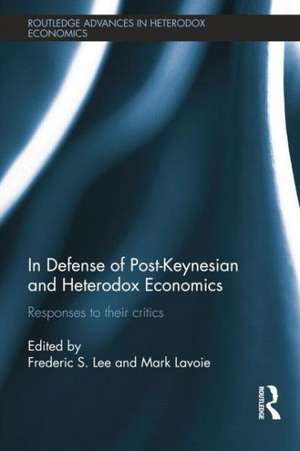In Defense of Post-Keynesian and Heterodox Economics: Responses to their Critics: Routledge Advances in Heterodox Economics
Editat de Frederic S. Lee, Marc Lavoieen Limba Engleză Paperback – 30 mai 2014
This book makes it clear that Post Keynesian/heterodox economics is, in spite of internal problems, a viable and important approach to economics and that it should resist the attempts of the critics to bury it. The reader will also find arguments that directly engage the critics and suggest that their views/criticisms are vacuous and wrong. As such, this will appeal to all who are interested in economic theory, economic history and who believe in challenging the orthodoxy.
| Toate formatele și edițiile | Preț | Express |
|---|---|---|
| Paperback (1) | 486.80 lei 43-57 zile | |
| Taylor & Francis – 30 mai 2014 | 486.80 lei 43-57 zile | |
| Hardback (1) | 1062.62 lei 43-57 zile | |
| Taylor & Francis – 4 sep 2012 | 1062.62 lei 43-57 zile |
Din seria Routledge Advances in Heterodox Economics
-
 Preț: 288.56 lei
Preț: 288.56 lei -
 Preț: 379.30 lei
Preț: 379.30 lei - 26%
 Preț: 848.96 lei
Preț: 848.96 lei - 18%
 Preț: 1058.65 lei
Preț: 1058.65 lei - 18%
 Preț: 1173.97 lei
Preț: 1173.97 lei - 18%
 Preț: 1057.13 lei
Preț: 1057.13 lei -
 Preț: 449.41 lei
Preț: 449.41 lei - 18%
 Preț: 1052.35 lei
Preț: 1052.35 lei - 25%
 Preț: 767.88 lei
Preț: 767.88 lei - 15%
 Preț: 267.20 lei
Preț: 267.20 lei - 18%
 Preț: 1171.54 lei
Preț: 1171.54 lei - 18%
 Preț: 1068.18 lei
Preț: 1068.18 lei -
 Preț: 482.62 lei
Preț: 482.62 lei - 18%
 Preț: 1068.18 lei
Preț: 1068.18 lei - 26%
 Preț: 765.01 lei
Preț: 765.01 lei - 15%
 Preț: 460.20 lei
Preț: 460.20 lei - 26%
 Preț: 762.57 lei
Preț: 762.57 lei -
 Preț: 483.49 lei
Preț: 483.49 lei - 12%
 Preț: 299.25 lei
Preț: 299.25 lei -
 Preț: 467.82 lei
Preț: 467.82 lei - 26%
 Preț: 847.31 lei
Preț: 847.31 lei -
 Preț: 410.46 lei
Preț: 410.46 lei - 15%
 Preț: 423.60 lei
Preț: 423.60 lei -
 Preț: 492.96 lei
Preț: 492.96 lei - 18%
 Preț: 1050.02 lei
Preț: 1050.02 lei - 12%
 Preț: 325.34 lei
Preț: 325.34 lei - 18%
 Preț: 1055.51 lei
Preț: 1055.51 lei - 25%
 Preț: 571.41 lei
Preț: 571.41 lei -
 Preț: 410.46 lei
Preț: 410.46 lei - 18%
 Preț: 1064.01 lei
Preț: 1064.01 lei - 26%
 Preț: 848.15 lei
Preț: 848.15 lei - 18%
 Preț: 699.96 lei
Preț: 699.96 lei - 18%
 Preț: 1061.06 lei
Preț: 1061.06 lei - 26%
 Preț: 821.53 lei
Preț: 821.53 lei - 18%
 Preț: 1055.32 lei
Preț: 1055.32 lei
Preț: 486.80 lei
Nou
Puncte Express: 730
Preț estimativ în valută:
93.15€ • 97.50$ • 77.53£
93.15€ • 97.50$ • 77.53£
Carte tipărită la comandă
Livrare economică 31 martie-14 aprilie
Preluare comenzi: 021 569.72.76
Specificații
ISBN-13: 9781138799196
ISBN-10: 113879919X
Pagini: 280
Ilustrații: 5
Dimensiuni: 156 x 234 x 16 mm
Greutate: 0.4 kg
Ediția:1
Editura: Taylor & Francis
Colecția Routledge
Seria Routledge Advances in Heterodox Economics
Locul publicării:Oxford, United Kingdom
ISBN-10: 113879919X
Pagini: 280
Ilustrații: 5
Dimensiuni: 156 x 234 x 16 mm
Greutate: 0.4 kg
Ediția:1
Editura: Taylor & Francis
Colecția Routledge
Seria Routledge Advances in Heterodox Economics
Locul publicării:Oxford, United Kingdom
Public țintă
Postgraduate and UndergraduateCuprins
Preface: The Future of Post-Keynesian Economics and Heterodox Economics Contra Their Critics Frederic S. Lee and Marc Lavoie 1. Post-Keynesians and Others John King 2. After the Crisis: Perspectives for Post-Keynesian Economics Marc Lavoie 3. Post-Keynesian Economics - How to Move Forward Engelbert Stockhammer and Paul Ramskogler 4. A Guide to Paradigmatic Self-Marginalization: Lessons for Post-Keynesian Economists Leonhard Dobusch and Jakob Kappeler 5. Post-Keynesianism, Heterodoxy, and Mainstream Economics David Dequech 6. Heterodox Economics and its Critics Frederic S. Lee 7. Building Heterodox Community: Pluralism in Fragmented Epistemological Communities Barbara E. Hopkins 8. Conversation or Monologue? On Advising Heterodox Economists with Addendum Matias Vernengo 9. Economics Fit for the Queen: Barriers and Opportunities Peter E. Earl and Ti-Ching Peng 10. Orthodoxy, Heterodoxy, and Post-Keynesian Economics: Notes on Taxonomy Gary Mongiovi 11. The Global Financial Crisis and the Role of Engagement with the Mainstream in the Future of Post-Keynesian Economics Louis-Philippe Rochon and Peter Docherty 12. Notes on Ideology and Methodology with Addendum Duncan K. Foley 13. Whither Heterodoxy? Or Where is Heterodox Economics Going? Liem Hoang-Ngoc
Notă biografică
Frederic S. Lee is Professor of Economics at the University of Missouri, Kansas City, USA.
Marc Lavoie is Professor of Economics at the University of Ottowa, Canada.
Marc Lavoie is Professor of Economics at the University of Ottowa, Canada.
Descriere
Post-Keynesian and heterodox economics challenge the mainstream economics theories that dominate the teaching at universities and government economic policies. And it was these latter theories that helped to cause the great depression the United States and the rest of the world is in. However, most economists and the top 1% do not want mainstream theories challenged—for to do so would mean questioning why and how the 1% got where they are. Therefore, numerous efforts have been and are being made to discredit if not suppress Post-Keynesian and heterodox economics. These efforts have had some success; this book is a response to them.
















